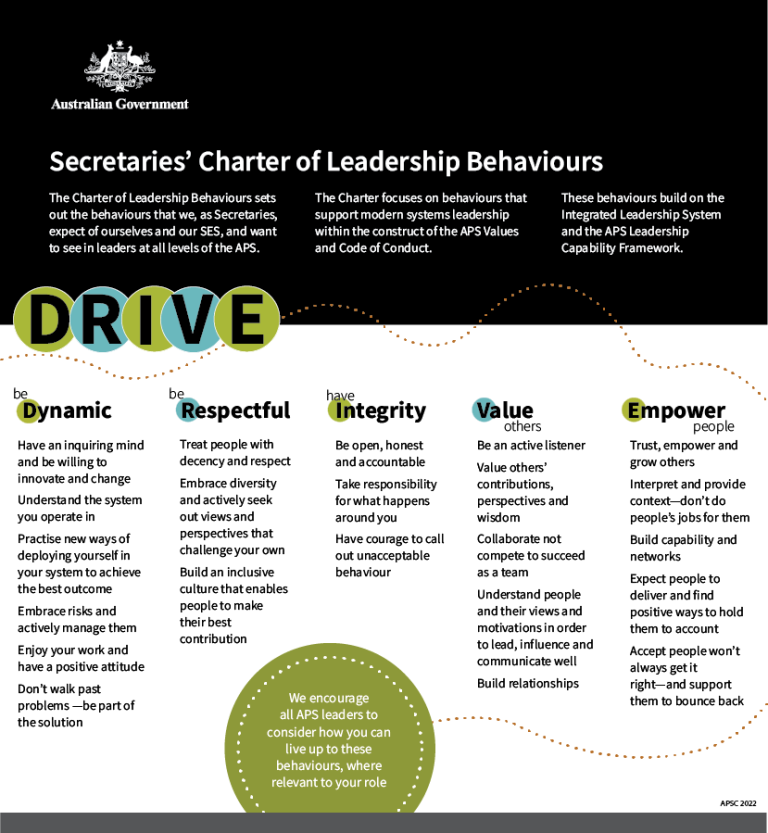Secretaries Charter of Leadership Behaviours

The Secretaries Charter of Leadership Behaviours was released in August 2022. It sets out the behaviours Secretaries expect of themselves and the Senior Executive Service and want to see in leaders at all levels across the Australian Public Service.

Image: Australian Public Service Commission
In November 2022, the Australian Public Service Commission surveyed a cross sample of over 5,000 APS employees to explore the extent to which these behaviours are being demonstrated by APS managers.
Survey results from direct reports indicate that most managers at all classifications are perceived as demonstrating the behaviours outlined in the charter.
Areas of relative strength include managers treating others with respect, having a positive attitude and listening to others. Certain behaviours such as calling out unacceptable behaviour and engagement with risk are less commonly observed. This was particularly true for managers at the APS 5 and 6 levels.
These survey findings are listed against each DRIVE behaviour.
Be Dynamic: Most respondents agree their manager leads with dynamic behaviours.
- More than three-quarters agree their immediate supervisor demonstrates positivity (84%), problem solving (81%) and innovation (77%).
- Just under two-thirds agree their immediate supervisor engages with risk (64%).
- Those reporting to Executive Level and APS levels showed the lowest levels of agreement, and this was particularly true for innovation and engagement with risk.
Be Respectful: Most respondents agree their manager treats people with respect.
- More than three-quarters of respondents agree their immediate supervisor treats people with respect (87%) and actively ensures that everyone can be included to make their best contribution (77%).
Have Integrity: Most respondents agree their manager acts with integrity, but there is room for improvement
- Around 4 out of every 5 respondents agree their immediate supervisor is open and honest (82%), accountable (81%), and takes responsibility for what happens in their workgroup (79%).
- Two-thirds of respondents agree that their immediate supervisor calls out unacceptable behaviour (67%).
Value others: Most respondents agree their manager values others.
- More than three-quarters of respondents agree their immediate supervisor listens to others (83%), values the contributions and perspectives of others (81%), builds effective relationships (78%), and understands their teams (76%).
Empower people: Most respondents agree their manager empowers people.
- Around three-quarters of respondents agree their immediate supervisor uses networks to achieve outcomes (78%), supports people to bounce back (75%), provides enough information to get the job done (73%), and empowers others (73%).
For most DRIVE behaviours, those reporting to APS 5 to APS 6 levels showed the lowest levels of agreement.
The APS Academy conducts programs to build leadership capability at all levels, including the APS Graduate Development Program, Management in Action targeting APS 5 to EL 1s, the Working Effectively series for all APS and EL employees, APS Leadership Edge program for EL 2s and the SES immersive learning programs. There is still room to improve, and work is ongoing to strengthen DRIVE behaviours across the service.
See also
Australian Government (n.d) Secretaries Charter of Leadership Behaviours, APSC website, https://www.apsc.gov.au/initiatives-and-programs/learning-and-development/secretaries-charter-leadership-behaviours, accessed 5 October 2023.



